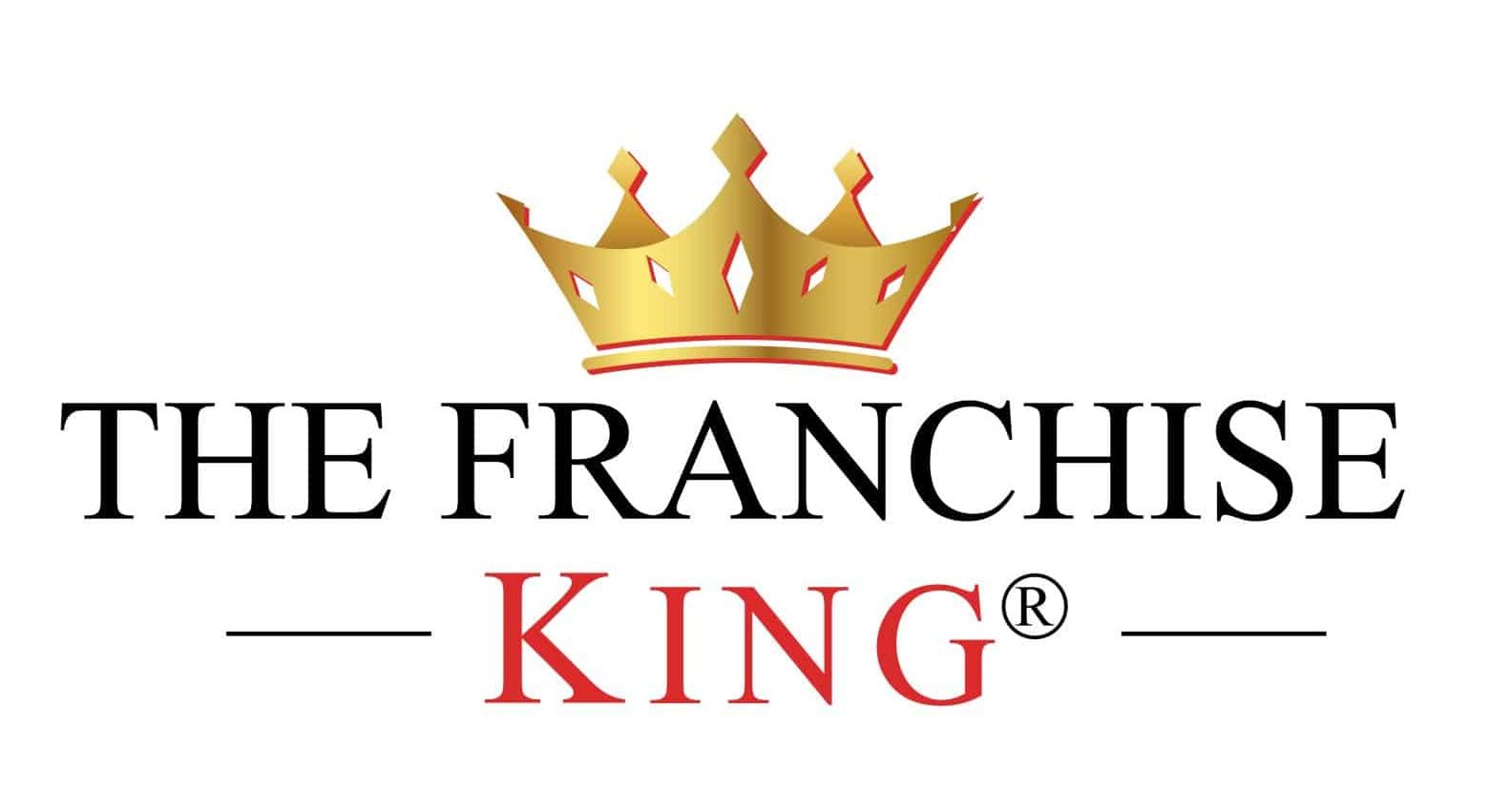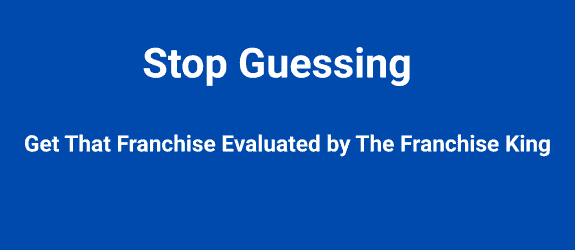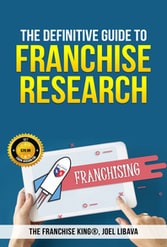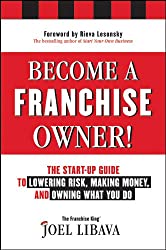
Let’s talk about the franchising success rate. And how it’s spun.
The Likelihood Of Success In Franchise Ownership
If you buy a franchise, your chances of success depends on a lot of factors. Remember…you read that here.
But before we continue, you need to keep the failure rate in mind, too. Why?
Because it happens.
In particular, people who own franchises do go out of business. They fail. Except you don’t hear about it a lot. And failing sucks. Let’s continue.
The Journalist In This Story Isn’t Wrong About The Franchising Success Rate
The reason I’m writing about this topic today has to do with “The stuff you read about on the internet.”
Translation; don’t believe everything you read. Let me show you what I mean.
Several years ago, the editorial staff at The Sacramento Business Journal asked 3 people from the franchise industry what they thought were the advantages of franchising.
Now the answers weren’t bad.
Except for the one from a California franchise broker.
Here’s what she told the Sacramento Business Journal reporter:
“The biggest advantage is the likelihood of success.”
Quote-Unquote.
I’m not kidding, you can read that completely incorrect answer right here.
Folks, the likelihood of success in a franchise isn’t necessarily higher-when compared to starting a business from scratch.
So don’t fall for it when you read articles or watch professionally produced videos from so-called franchise experts when they tell you “it’s safer to buy a franchise.” They’re lying. It’s a mirage.
Rinse And Repeat
Interestingly enough, another franchise broker said something eerily similar a while back over at Palo Alto Online:
“The No. 1 reason businesses fail is lack of cash for working capital. After 10 years, only 16 percent of existing start-ups are still in business. With franchises, it’s 90 percent,”
WRONG! Read why
Don’t Drink The Franchising Success Rate Kool-Aid!
Kool-Aid tastes pretty good. I loved it as a kid. The green kind.
I know. There’s a lot of sugar in it. That’s bad.
But what if something worse than sugar was added to your beverage?
Okay…okay. The Kool-Aid I’m referring to is a metaphor. As in “Don’t drink the Kool-Aid.”
Another way of saying it; don’t believe everything you’re told.
FYI: “Drinking the Kool-Aid” is an expression used to refer to a person who believes in a possibly doomed or dangerous idea because of perceived potential high rewards. The phrase often carries a negative connotation. It can also be used ironically or humorously to refer to accepting an idea or changing a preference due to popularity, peer pressure, or persuasion. In recent years it has evolved further to mean extreme dedication to a cause or purpose, so extreme that one would “drink the Kool-Aid” and die for the cause.
The phrase originates from events in Jonestown, Guyana, on November 18, 1978, in which over 900 members of the Peoples Temple movement died. The movement’s leader, Jim Jones, called a mass meeting at the Jonestown pavilion after the murder of U.S. Congressman Leo Ryan and others in nearby Port Kaituma. Jones proposed “revolutionary suicide” by way of ingesting a powdered drink mix lethally laced with cyanide and other drugs which had been prepared by his aides.
(Courtesy of Xu, H. Drinking the Kool-Aid. Encyclopedia. Available online: https://encyclopedia.pub/entry/35928 – accessed on 19 December 2023).
That wasn’t pretty.
But the fact is, although buying the right franchise for you can help you succeed as an owner of a business, there are no guarantees. Stuff happens. For example:
- You could choose a lousy location.
- The franchisor may turn out to be not so good.
- A natural disaster in your geographical area could affect your business.
Right?
But still…you want to be your own boss. Regardless of the risks.
Are You Ready To Be The Boss?
If you’ve been out of work for awhile, or you’re in a miserable career situation, you may start to become “open” to other things.
For example, you could start becoming open to the idea of going into business for yourself. Even if you’ve never really thought about it before. That’s fine. You should look into it.
Hey-it sure beats hanging in your PJ’s every morning looking at all of of those darn online job sites.
As a matter of fact, owning a business-not having a boss, may sound pretty good to you at this point in your life.
What About A Franchise Business?
Sure. Why the heck not?
After all, you’d be buying a proven (hopefully) business system. That’s certainly an advantage.
Plus, with a franchise, you won’t have to guess the amount of money you’ll need up-front to start your business.
The research isn’t that tough–if you know how to do it.
And you can hire a franchise attorney to help you figure out the legal stuff so you can be protected.
One more thing: the best thing about owning a franchise isn’t something you can see or touch. It’s something you need to feel.
Forget The Statistics
I respect Scott Shane a lot.
For one, he’s the Professor of Entrepreneurial Studies at Case Western Reserve University.
Secondly, he’s the author of several business books, including “Illusions of Entrepreneurship.”
In addition, like me, he wrote a lot of data-centric articles for Small Business Trends, a huge internet property in the Small Business space. And the data that he assembles, and shares, is top-shelf.
Like the article he wrote about business success and failure rates.
(Keep it coming, Scott)
That said, Scott’s statistics are the real deal. He points to specific data.
Which is the opposite of what the two California franchise brokers did in the articles they were quoted in.
But let’s forget the statistics on franchising success rates for now.
Let’s focus on what matters instead.
You Matter. And The Risk You’re Willing To Take Matters.
If you’re seriously thinking of plunking down a portion of your hard-earned money to become the owner of a franchise business, it’s important for you to focus on some serious fact-gathering.
Some of your fact-gathering should include reading factual articles about franchising and business. Articles that include statistical information are good. Read about the importance of planning.
Bottom line?
The information that you’ll be gathering and evaluating is super important. It’s something you need to do. Why?
Because it can help you lower your risk and increase your chance of franchise ownership success.
Your success.
Not the mirage of franchising success.
**Image 2 courtesy of Andrea Black (Lacuna), on Flickr
About the Author
The Franchise King®, Joel Libava, is a leading franchise expert, author of "Become a Franchise Owner!" and "The Definitive Guide to Franchise Research." Featured in outlets like The New York Times, CNBC, and Franchise Direct, Joel’s no-nonsense approach as a trusted Franchise Ownership Advisor helps aspiring franchisees make smart, informed decisions in their journey to franchise ownership. He owns and operates this franchise blog.
Note: When you buy through links on this website, we may earn an affiliate commission.










